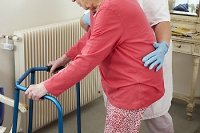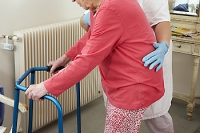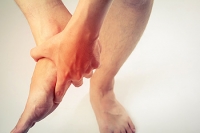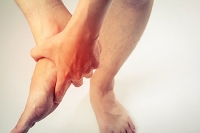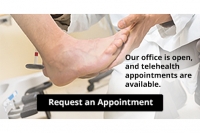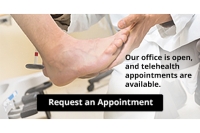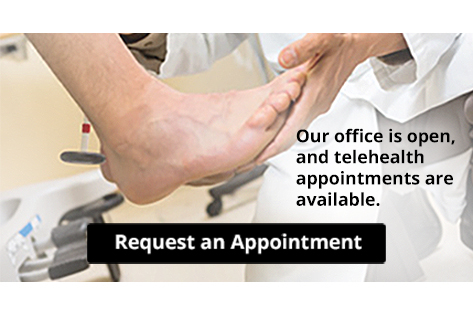
Blog (791)
Plantar Warts Can Be Treated!
Foot Stretches for Seniors
It can be incredibly beneficial for elderly patients to regularly perform foot stretches. When a senior patient's feet are strong, as well as flexible, it may make them more likely to avoid accidentally falling. By performing stretches, you may increase your blood circulation, as well as improve your range of motion, muscle strength, and balance. One example of a foot stretch that is easily practiced is called an ankle rotation. This can be done by sitting up straight in a chair, and resting your ankle on the opposite knee. Begin rotating your ankle first clockwise, then counterclockwise, then you may switch ankles. For an additional stretch, make sure your toes are pointed straight during this exercise. For more advice on elderly foot care and low-impact exercises for the feet, it is suggested that you speak with your local podiatrist.
Exercising your feet regularly with the proper foot wear is a great way to prevent injuries and build strength. If you have any concerns about your feet, contact Dr. Kenneth Donovan from Advanced Care Foot and Ankle. Our doctor can provide the care you need to keep you pain-free and on your feet.
Exercise for Your Feet
Exercise for your feet can help you gain strength, mobility and flexibility in your feet. They say that strengthening your feet can be just as rewarding as strengthening another part of the body. Your feet are very important, and we often forget about them in our daily tasks. But it is because of our feet that are we able to get going and do what we need to. For those of us fortunate enough to not have any foot problems, it is an important gesture to take care of them to ensure good health in the long run.
Some foot health exercises can include ankle pumps, tip-toeing, toe rises, lifting off the floor doing reps and sets, and flexing the toes. It is best to speak with Our doctor to determine an appropriate regimen for your needs. Everyone’s needs and bodies are different, and the activities required to maintain strength in the feet vary from individual to individual.
Once you get into a routine of doing regular exercise, you may notice a difference in your feet and how strong they may become.
If you have any questions please feel free to contact one of our offices located in Warren, Livingston, and Toms River, NJ . We offer the newest diagnostic and treatment technologies for all your foot and ankle needs.
Foot Stretches for Seniors
 It can be incredibly beneficial for elderly patients to regularly perform foot stretches. When a senior patient's feet are strong, as well as flexible, it may make them more likely to avoid accidentally falling. By performing stretches, you may increase your blood circulation, as well as improve your range of motion, muscle strength, and balance. One example of a foot stretch that is easily practiced is called an ankle rotation. This can be done by sitting up straight in a chair, and resting your ankle on the opposite knee. Begin rotating your ankle first clockwise, then counterclockwise, then you may switch ankles. For an additional stretch, make sure your toes are pointed straight during this exercise. For more advice on elderly foot care and low-impact exercises for the feet, it is suggested that you speak with your local podiatrist.
It can be incredibly beneficial for elderly patients to regularly perform foot stretches. When a senior patient's feet are strong, as well as flexible, it may make them more likely to avoid accidentally falling. By performing stretches, you may increase your blood circulation, as well as improve your range of motion, muscle strength, and balance. One example of a foot stretch that is easily practiced is called an ankle rotation. This can be done by sitting up straight in a chair, and resting your ankle on the opposite knee. Begin rotating your ankle first clockwise, then counterclockwise, then you may switch ankles. For an additional stretch, make sure your toes are pointed straight during this exercise. For more advice on elderly foot care and low-impact exercises for the feet, it is suggested that you speak with your local podiatrist.
Exercising your feet regularly with the proper foot wear is a great way to prevent injuries and build strength. If you have any concerns about your feet, contact Dr. Kenneth Donovan from Advanced Care Foot and Ankle. Our doctor can provide the care you need to keep you pain-free and on your feet.
Exercise for Your Feet
Exercise for your feet can help you gain strength, mobility and flexibility in your feet. They say that strengthening your feet can be just as rewarding as strengthening another part of the body. Your feet are very important, and we often forget about them in our daily tasks. But it is because of our feet that are we able to get going and do what we need to. For those of us fortunate enough to not have any foot problems, it is an important gesture to take care of them to ensure good health in the long run.
Some foot health exercises can include ankle pumps, tip-toeing, toe rises, lifting off the floor doing reps and sets, and flexing the toes. It is best to speak with Our doctor to determine an appropriate regimen for your needs. Everyone’s needs and bodies are different, and the activities required to maintain strength in the feet vary from individual to individual.
Once you get into a routine of doing regular exercise, you may notice a difference in your feet and how strong they may become.
If you have any questions please feel free to contact one of our offices located in Warren, Livingston, and Toms River, NJ . We offer the newest diagnostic and treatment technologies for all your foot and ankle needs.
What Does Foot Pain Indicate?
Foot pain is considered to be a common ailment among many people. It can include pain in the toes, heel, and arch areas, which may be indicative of serious foot conditions. Toe pain can be a symptom of certain types of arthritis, bunions, or it may originate from an ingrown toenail. If there is pain in the ball of the foot, it may be linked to a condition that is referred to as Morton’s neuroma, which impacts the nerves of the foot. A common form of pain and discomfort in the heel can be connected to plantar fasciitis, heel spurs, or possibly from an Achilles tendon injury. If you are experiencing foot pain for any reason, it is strongly advised that you are under the care of a podiatrist.
Foot Pain
Foot pain can be extremely painful and debilitating. If you have a foot pain, consult with Dr. Kenneth Donovan from Advanced Care Foot and Ankle. Our doctor will assess your condition and provide you with quality foot and ankle treatment.
Causes
Foot pain is a very broad condition that could be caused by one or more ailments. The most common include:
- Bunions
- Hammertoes
- Plantar Fasciitis
- Bone Spurs
- Corns
- Tarsal Tunnel Syndrome
- Ingrown Toenails
- Arthritis (such as Gout, Rheumatoid, and Osteoarthritis)
- Flat Feet
- Injury (from stress fractures, broken toe, foot, ankle, Achilles tendon ruptures, and sprains)
- And more
Diagnosis
To figure out the cause of foot pain, podiatrists utilize several different methods. This can range from simple visual inspections and sensation tests to X-rays and MRI scans. Prior medical history, family medical history, and any recent physical traumatic events will all be taken into consideration for a proper diagnosis.
Treatment
Treatment depends upon the cause of the foot pain. Whether it is resting, staying off the foot, or having surgery; podiatrists have a number of treatment options available for foot pain.
If you have any questions, please feel free to contact one of our offices located in Warren, Livingston, and Toms River, NJ . We offer the newest diagnostic and treatment technologies for all your foot care needs.
What Does Foot Pain Indicate?
 Foot pain is considered to be a common ailment among many people. It can include pain in the toes, heel, and arch areas, which may be indicative of serious foot conditions. Toe pain can be a symptom of certain types of arthritis, bunions, or it may originate from an ingrown toenail. If there is pain in the ball of the foot, it may be linked to a condition that is referred to as Morton’s neuroma, which impacts the nerves of the foot. A common form of pain and discomfort in the heel can be connected to plantar fasciitis, heel spurs, or possibly from an Achilles tendon injury. If you are experiencing foot pain for any reason, it is strongly advised that you are under the care of a podiatrist.
Foot pain is considered to be a common ailment among many people. It can include pain in the toes, heel, and arch areas, which may be indicative of serious foot conditions. Toe pain can be a symptom of certain types of arthritis, bunions, or it may originate from an ingrown toenail. If there is pain in the ball of the foot, it may be linked to a condition that is referred to as Morton’s neuroma, which impacts the nerves of the foot. A common form of pain and discomfort in the heel can be connected to plantar fasciitis, heel spurs, or possibly from an Achilles tendon injury. If you are experiencing foot pain for any reason, it is strongly advised that you are under the care of a podiatrist.
Foot Pain
Foot pain can be extremely painful and debilitating. If you have a foot pain, consult with Dr. Kenneth Donovan from Advanced Care Foot and Ankle. Our doctor will assess your condition and provide you with quality foot and ankle treatment.
Causes
Foot pain is a very broad condition that could be caused by one or more ailments. The most common include:
- Bunions
- Hammertoes
- Plantar Fasciitis
- Bone Spurs
- Corns
- Tarsal Tunnel Syndrome
- Ingrown Toenails
- Arthritis (such as Gout, Rheumatoid, and Osteoarthritis)
- Flat Feet
- Injury (from stress fractures, broken toe, foot, ankle, Achilles tendon ruptures, and sprains)
- And more
Diagnosis
To figure out the cause of foot pain, podiatrists utilize several different methods. This can range from simple visual inspections and sensation tests to X-rays and MRI scans. Prior medical history, family medical history, and any recent physical traumatic events will all be taken into consideration for a proper diagnosis.
Treatment
Treatment depends upon the cause of the foot pain. Whether it is resting, staying off the foot, or having surgery; podiatrists have a number of treatment options available for foot pain.
If you have any questions, please feel free to contact one of our offices located in Warren, Livingston, and Toms River, NJ . We offer the newest diagnostic and treatment technologies for all your foot care needs.
Swollen Feet and Being Pregnant
It is a common observation among women who are pregnant to notice specific changes with their bodies, in addition to their growing fetus. Many of these changes involve the feet. Specific foot ailments may cause a general feeling of discomfort for pregnant women. A common foot condition is known as flat feet, which can happen as a result of the added weight the feet must support. As the arch gradually diminishes, the feet may become achy and feel tired for the majority of the day. Mild relief may be felt when shoes that are worn fit correctly. It may also help to wear insoles which may provide an arch. The toenails may be difficult to cut and maintain, and ingrown toenails may develop as a result of this. Additionally, swollen feet is a common side effect of pregnancy, and it is beneficial to elevate the feet as often as possible throughout the day. For additional information about how pregnancy can affect the feet, please consult with a podiatrist.
Pregnant women with swollen feet can be treated with a variety of different methods that are readily available. For more information about other cures for swollen feet during pregnancy, consult with Dr. Kenneth Donovan from Advanced Care Foot and Ankle. Our doctor will attend to all of your foot and ankle needs.
What Foot Problems Can Arise During Pregnancy?
One problem that can occur is overpronation, which occurs when the arch of the foot flattens and tends to roll inward.
This can cause pain and discomfort in your heels while you’re walking or even just standing up, trying to support your baby.
Another problem is edema, or swelling in the extremities. This often affects the feet during pregnancy but tends to occur in the later stages.
How Can I Keep My Feet Healthy During Pregnancy?
- Wearing orthotics can provide extra support for the feet and help distribute weight evenly
- Minimize the amount of time spent walking barefoot
- Wear shoes with good arch support
- Wear shoes that allow for good circulation to the feet
- Elevate feet if you experience swelling
- Massage your feet
- Get regular, light exercise, such as walking, to promote blood circulation to the feet
If you have any questions please feel free to contact one of our offices located in Warren, Livingston, and Toms River, NJ . We offer the newest diagnostic and treatment technologies for all your foot and ankle needs.
Swollen Feet and Being Pregnant
 It is a common observation among women who are pregnant to notice specific changes with their bodies, in addition to their growing fetus. Many of these changes involve the feet. Specific foot ailments may cause a general feeling of discomfort for pregnant women. A common foot condition is known as flat feet, which can happen as a result of the added weight the feet must support. As the arch gradually diminishes, the feet may become achy and feel tired for the majority of the day. Mild relief may be felt when shoes that are worn fit correctly. It may also help to wear insoles which may provide an arch. The toenails may be difficult to cut and maintain, and ingrown toenails may develop as a result of this. Additionally, swollen feet is a common side effect of pregnancy, and it is beneficial to elevate the feet as often as possible throughout the day. For additional information about how pregnancy can affect the feet, please consult with a podiatrist.
It is a common observation among women who are pregnant to notice specific changes with their bodies, in addition to their growing fetus. Many of these changes involve the feet. Specific foot ailments may cause a general feeling of discomfort for pregnant women. A common foot condition is known as flat feet, which can happen as a result of the added weight the feet must support. As the arch gradually diminishes, the feet may become achy and feel tired for the majority of the day. Mild relief may be felt when shoes that are worn fit correctly. It may also help to wear insoles which may provide an arch. The toenails may be difficult to cut and maintain, and ingrown toenails may develop as a result of this. Additionally, swollen feet is a common side effect of pregnancy, and it is beneficial to elevate the feet as often as possible throughout the day. For additional information about how pregnancy can affect the feet, please consult with a podiatrist.
Pregnant women with swollen feet can be treated with a variety of different methods that are readily available. For more information about other cures for swollen feet during pregnancy, consult with Dr. Kenneth Donovan from Advanced Care Foot and Ankle. Our doctor will attend to all of your foot and ankle needs.
What Foot Problems Can Arise During Pregnancy?
One problem that can occur is overpronation, which occurs when the arch of the foot flattens and tends to roll inward. This can cause pain and discomfort in your heels while you’re walking or even just standing up, trying to support your baby.
Another problem is edema, or swelling in the extremities. This often affects the feet during pregnancy but tends to occur in the later stages.
How Can I Keep My Feet Healthy During Pregnancy?
- Wearing orthotics can provide extra support for the feet and help distribute weight evenly
- Minimize the amount of time spent walking barefoot
- Wear shoes with good arch support
- Wear shoes that allow for good circulation to the feet
- Elevate feet if you experience swelling
- Massage your feet
- Get regular, light exercise, such as walking, to promote blood circulation to the feet
If you have any questions please feel free to contact one of our offices located in Warren, Livingston, and Toms River, NJ . We offer the newest diagnostic and treatment technologies for all your foot and ankle needs.
Care In The Comfort Of Your Home With Telehealth
Care In The Comfort Of Your Home With Telehealth
How Often Should Shoes Be Replaced
Research has indicated that when the correct shoes are worn, the overall body can be positively affected. There are several factors to look for when purchasing shoes. These can include ensuring the heels have a comfortable back, and that there is adequate room for the toes to move freely in. Additionally, it is beneficial if the shoe has ample arch support. Many shoes need to be replaced after a specific distance is reached, which is often between 350-500 miles. Many patients may choose to purchase new running shoes after one year, while keeping other shoes for walking. If you would like additional information about proper shoe duration, and how to look for shoes that fit properly, please consult with a podiatrist.
It is important to find shoes that fit you properly in order to avoid a variety of different foot problems. For more information about treatment, contact Dr. Kenneth Donovan from Advanced Care Foot and Ankle. Our doctor will treat your foot and ankle needs.
Proper Shoe Fitting
Shoes have many different functions. They cushion our body weight, protect our feet, and allow us to safely play sports. You should always make sure that the shoes you wear fit you properly in order to avoid injuries and deformities such as: bunions, corns, calluses, hammertoes, plantar fasciitis, stress fractures, and more. It is important to note that although a certain pair of shoes might be a great fit for someone else, that doesn’t mean they will be a great fit for you. This is why you should always try on shoes before buying them to make sure they are worth the investment. Typically, shoes need to be replaced ever six months to one year of regular use.
Tips for Proper Shoe Fitting
- Select a shoe that is shaped like your foot
- Don’t buy shoes that fit too tight, expecting them to stretch to fit
- Make sure there is enough space (3/8” to ½”) for your longest toe at the end of each shoe when you are standing up
- Walk in the shoes to make sure they fit and feel right
- Don’t select shoes by the size marked inside the shoe, but by how the shoe fits your foot
The shoes you buy should always feel as good as they look. Shoes that fit properly will last longer, feel better, and improve your way of life each day.
If you have any questions, please feel free to contact one of our offices located in Warren, Livingston, and Toms River, NJ . We offer the newest diagnostic and treatment technologies for all your foot care needs.


